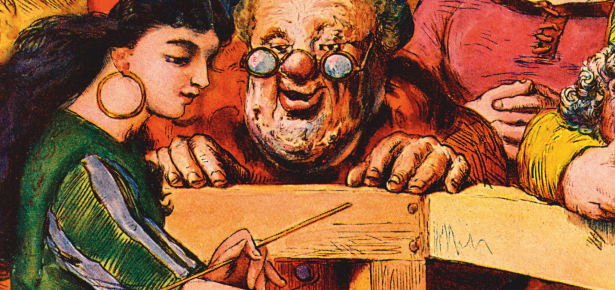
Political astrology is one of those idiosyncratic 18th century genres that seem bizarre to the modern sensibility.[1] Despite this unfamiliarity, I would suggest that a close analogue of political astrology has fiercely reasserted itself in the guise of the so-called “QAnon” conspiracy theory. Initially an obscure phenomenon relegated to the internet demimonde, it gradually began to gain attention and a wider political following, finally entering mainstream consciousness through helping to foment the January 6 debacle.
As with its 18th century counterpart, QAnon consists of vague, ominous sounding predictions that subtly reinforce a specific political ideology and its related cultural bent. Q—the putative figure behind the mysterious internet posts—does not claim astrological insight into the future so much as specific insider knowledge provided by high-level secret access. The effect is the same in any event: the writer’s professed arcane, quasi-mystical wisdom supposedly provides a privileged purchase for making a series of shocking and scandalous prediction—often forecasting the deaths of prominent members of rival political and cultural groups—that all redound to the benefit of a particular faction, party, or ideology.
Like QAnon, political astrology seems strange precisely because it is such a transparently cynical ploy that it is hard to believe that anyone could take it seriously. Swift’s Bickerstaff hoax, a response to the political astrologer John Partridge, is the best-known document relating to this genre, and it makes this very point. Intentionally bucking the trend of offering vague astrological predictions, Swift specifically foretells Partridge’s death; this prompted Partridge foolishly to deny that he was dead, which in turn led to Swift’s famous jibe in retort that Partridge’s readers “were sure no Man alive ever writ such damn’d Stuff as this.” [2]
As with claims about readers taking Gulliver’s Travels and similar works as authentic documents, one must take with a grain of salt the apocryphal assertions that enough people believed that Partridge had died that, Swift in effect, helped to precipitate Partridge’s death. The Wikipedia entry for “Isaac Bicksertaff” states, not citing any sources, “The hoax, gaining immense popularity, plagued Partridge till the true end of his life. Mourners, believing him dead, often kept him awake at night by crying outside his window.”[3] While Partridge’s response to Swift, asserting that he was in fact alive, certainly made him an object of ridicule, Swift’s satire did not have fatal effects on sales of Partridge’s astrological almanac, let alone his health. [4]
Even if the stories about Patridge’s death being taken seriously are overblown, they are nonetheless an illustration of the very phenomenon I study in my book: ironic forms like satire always link up, implicitly or explicitly, with genuine beliefs. Swift’s hoax is a good index of how something like QAnon functions: what begins as a cynical scheme or satirical ploy can end up creating genuine beliefs, despite or even because people are well-aware of the ruse.
Even those with perfect knowledge of Swift’s satirical purpose, by believing too deeply in the credulity of his targets, can effectively end up taking the satirical work just as seriously as they imagine Partridge’s gullible readers took his works. In a related vein, Steele of course later deployed the persona of Isaac Bickerstaff for more genuine purposes, another manifestation of the concomitant sincere energies satire produces. Defoe also borrowed the persona to create his own mock-astrological pamphlet entitled The British Visions. The irresistible fun of Swift’s April Fool’s joke neatly demonstrates the myriad ways in which earnest commitments always emerge alongside irony.
[1] For more on political astrology, see David Robert Woodcraft, A ‘politick engine’: Astrology and Politics 1678-1715 (PhD thesis, University of Warwick, 1997).
[2] Swift, A Vindication of Isaac Bickerstaff (London: 1709), 6.
[3] Wikipedia, “Isaac Bickerstaff, (Accessed March, 2022), https://en.wikipedia.org/wiki/Isaac_Bickerstaff
[4] See Patrick Curry, “Partridge, John,” Oxford Dictionary of National Biography, (Oxford: Oxford University Press 200).
Latest Comments
Have your say!